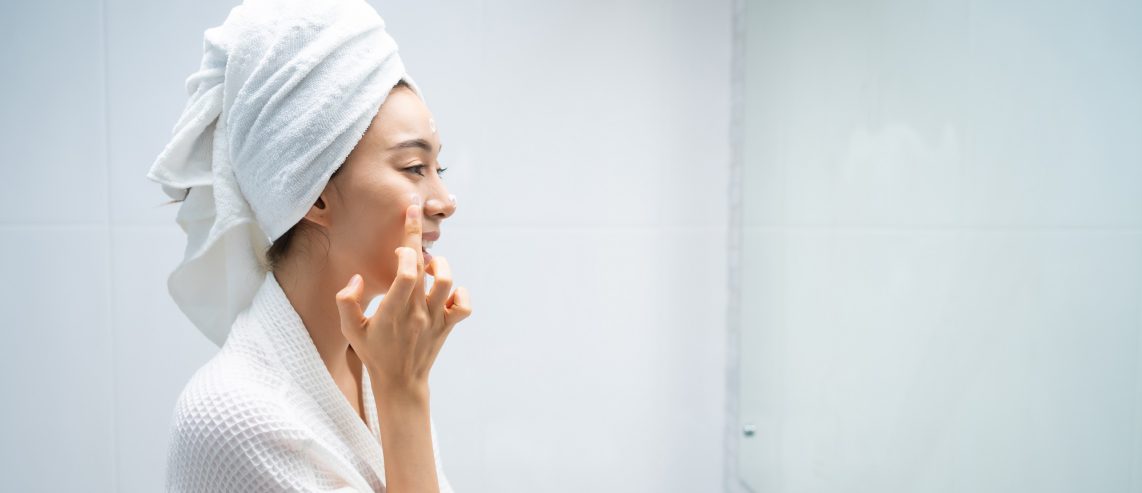Many skin care products these days boast that they contain retinol to combat signs of aging. They claim that retinol helps skin appear younger and firmer. But do retinol creams help with anti-aging?
What Is Retinol?
Retinol is a type of retinoid. Retinoids are a group of drugs derived from Vitamin A. Since the 1970s, doctors have used retinoids to treat acne, psoriasis, and some cancers.
Dermatologists also realized that retinoids have anti-aging properties. You can apply these medications to the skin to improve skin tone and reduce the signs of aging.
Retinol is one type of retinoid. It’s milder than prescription-strength retinoid products. Products containing retinol are available over the counter (OTC) in drug stores and beauty supply stores.
Never Miss a Beat!
Subscribe to Our HealthBeat Newsletter!
Thank you for subscribing!
You can now select the specific newsletters you'd like to receive.
You are already subscribed.
Subscribe to more newsletters in our email preference center.
Sorry, an error occurred. Please try again later.
Get Healthy Tips Sent to Your Phone!
Do Retinol Creams Help with Anti-Aging?
According to the American Academy of Dermatologists, retinol can smooth out fine lines and wrinkles in your skin. It can also improve uneven skin tone, pigmentation, and texture.
How retinol helps aging skin
After age 40, your skin dries out because it produces less oil. Smoking, pollution, wind, and ultraviolet (UV) rays from the sun can also damage your skin.
Retinol works by increasing how fast skin cells die and shed. That turnover exfoliates the outer layer of skin, boosting collagen production. That extra collagen, in turn, improves skin tone and reduces wrinkles.
Retinol comes in moisturizers, creams, eye treatments, and liquid serums. There are different forms of retinol. You may see it listed on a package as:
- Retinal
- Retinyl palmitate
- Retinyl acetate
- Retinyl linoleate
How to use retinol products
Retinol comes in topical OTC products. You apply these products directly to the skin instead of swallowing a pill. Retinol comes in serums, gels, creams, and emollients.
You should apply retinol creams at night after you wash your face. Retinol can make your skin more susceptible to sun damage. You shouldn’t use retinol products when you’re headed outside during the day.
When Should You Start Using Retinol for Anti-Aging?
There’s no one age or time in life to start using retinol. If you don’t have wrinkles yet, you can still benefit from a mild retinol product to keep your skin looking young.
Retinol is also effective for fighting mild acne or pigmentation problems, so adults of all ages use it. Many women in their thirties battle both acne and wrinkles, so retinol is a good combination treatment.
Is Retinol a Good Option for Me?
Although retinol can help slow down the signs of aging, it’s not for everyone. It’s best to see a board-certified dermatologist before starting any skincare treatment. Your doctor will be able to guide you to the right products for your skin.
Retinol may not work well for you if:
- You have rosacea. If you have a lot of redness or flushing in your face, it’s better to use medications specifically designed to treat rosacea.
- You’re pregnant. It’s safer for pregnant women to stay away from some medications, including retinol.
- You have sensitive skin. Retinol can sometimes aggravate sensitive skin.
Tips for Using Retinol for Anti-Aging
There are dozens of OTC products with retinol. You may find figuring out where to begin confusing. Here are some pointers.
- Start slowly. Use the mildest formula and apply it every other night instead of every night.
- Have patience. The effects of retinol are cumulative, and it may take weeks or even months to see results.
- Protect yourself from the sun. Retinol makes skin extra sensitive to the sun. During the day, use sunscreen with an SPF (sun-protection factor) of 30 or higher, wear a wide-brimmed hat, and seek shade outdoors.
- If you have dark skin, watch for hyperpigmentation. Retinol use can make skin of color more susceptible to dark marks.
- Use a moisturizer. Retinol products can dry skin out, so it’s important to keep your skin well-hydrated when using them.
When to call your doctor
You may notice some dryness and irritation when you first begin using retinol products. If your skin becomes very itchy or flushed, this may mean the product is too strong for your skin. If your skin becomes scaly, swollen, or discolored, you should stop using retinol and see a dermatologist as soon as possible.
Sources
National Institutes of Health, A comparative study of the effects of retinol and retinoic acid on histological, molecular, and clinical properties of human skin, Link
American Academy of Dermatology, Skin Care Secrets, Link
American Academy of Dermatology, Retinoid or Retinol? Link
American Osteopathic College of Dermatology, Retinoids, Topical, Link
About Dermatology
The UPMC Department of Dermatology diagnoses, treats, and manages numerous hair, skin, and nail conditions and diseases. We care for common and uncommon conditions, and our treatments include both surgical and nonsurgical options. We operate several specialty centers for various conditions. The UPMC Cosmetic Surgery and Skin Health Center is a comprehensive dermatologic laser facility, offering a full range of cosmetic services and procedures. With UPMC Hillman Cancer Center, we offer a Skin Cancer Program that provides complete care from screenings, diagnosis, treatment, and beyond. Find a dermatology provider near you.
